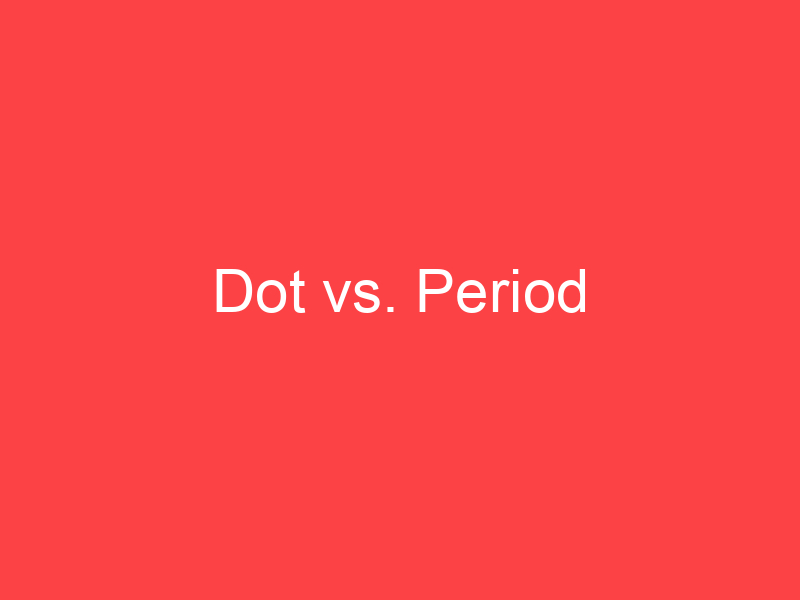-
Dot (noun)
A small spot.
“a dot of colour”
-
Dot (noun)
A abbreviated part of a word; a full stop; a period.
-
Dot (noun)
A point used as a diacritical mark above or below various letters of the Latin script, as in Ȧ, Ạ, Ḅ, Ḃ, Ċ.
-
Dot (noun)
A symbol used for separating the fractional part of a decimal number from the whole part, for indicating multiplication or a scalar product, or for various other purposes.
-
Dot (noun)
One of the two symbols used in Morse code.
-
Dot (noun)
A lump or clot.
-
Dot (noun)
Anything small and like a speck comparatively; a small portion or specimen.
“a dot of a child”
-
Dot (noun)
A dot ball.
-
Dot (noun)
buckshot, projectile from a “dotty” or shotgun
-
Dot (noun)
A dowry.
-
Dot (verb)
To cover with small spots (of some liquid).
“His jacket was dotted with splashes of paint.”
-
Dot (verb)
To add a dot (the symbol) or dots to.
“Dot your is and cross your ts.”
-
Dot (verb)
To mark by means of dots or small spots.
“to dot a line”
-
Dot (verb)
To mark or diversify with small detached objects.
“to dot a landscape with cottages”
-
Dot (verb)
To punch (a person).
-
Dot (preposition)
Dot product of the previous vector and the following vector.
“The work is equal to F dot Δx.”
-
Period (noun)
A length of time. from 17th c.
“There was a period of confusion following the announcement.”
“You’ll be on probation for a six-month period.”
-
Period (noun)
A period of time in history seen as a single coherent entity; an epoch, era. from 16th c.
“Food rationing continued in the post-war period.”
-
Period (noun)
The punctuation mark “.” (indicating the ending of a sentence or marking an abbreviation).
-
Period (noun)
The length of time during which the same characteristics of a periodic phenomenon recur, such as the repetition of a wave or the rotation of a planet. from 17th c.
-
Period (noun)
Female menstruation. from 18th c.
“When she is on her period, she prefers not to go swimming.”
-
Period (noun)
A section of an artist’s, writer’s (etc.) career distinguished by a given quality, preoccupation etc. from 19th c.
“This is one of the last paintings Picasso created during his Blue Period.”
-
Period (noun)
Each of the divisions into which a school day is split, allocated to a given subject or activity. from 19th c.
“I have math class in second period.”
-
Period (noun)
Each of the intervals into which various sporting events are divided. from 19th c.
“Gretzky scored in the last minute of the second period.”
-
Period (noun)
The length of time for a disease to run its course. 15th-19th c.
-
Period (noun)
An end or conclusion; the final point of a process etc. from 16th c.
-
Period (noun)
A complete sentence, especially one expressing a single thought or making a balanced, rhythmic whole. from 16th c.
-
Period (noun)
A specific moment during a given process; a point, a stage. 17th-19th c.
-
Period (noun)
A row in the periodic table of the elements. from 19th c.
-
Period (noun)
A Appendix: Geologic timescale.
-
Period (noun)
A Drosophila gene, the gene product of which is involved in regulation of the circadian rhythm.
-
Period (noun)
Two antecedent and a consequent phrase).
-
Period (noun)
The length of an interval over which a periodic function, periodic sequence or repeating decimal repeats; often the least such length.
-
Period (noun)
End point, conclusion.
-
Period (adjective)
Designating anything from a given historical era.
“a period car”
“a period TV commercial”
-
Period (adjective)
Evoking, or appropriate for, a particular historical period, especially through the use of elaborate costumes and scenery.
-
Period (interjection)
That’s final; that’s the end of the matter (analogous to a period ending a sentence).
“I know you don’t want to go to the dentist but your teeth need to be checked, period!”
-
Period (verb)
To come to a period; to conclude.
-
Period (verb)
To put an end to.
-
Dot (noun)
a small round mark or spot
“a symbol depicted in coloured dots”
-
Dot (noun)
a small round mark written or printed as part of an i or j, as one of a series of marks to signify omission, or as a full stop.
-
Dot (noun)
a small round mark used to denote the lengthening of a note or rest by half, or to indicate staccato.
-
Dot (noun)
the shorter signal of the two used in Morse code.
-
Dot (noun)
used to refer to an object that appears tiny because it is far away
“they were mere dots on the horizon now”
-
Dot (noun)
used to indicate the punctuation separating parts of an email or website address
“OUP dot com”
-
Dot (noun)
a dowry from which only the interest or annual income was available to the husband.
-
Dot (verb)
mark with a small spot or spots
“wet spots of rain began to dot his shirt”
-
Dot (verb)
(of a number of items) be scattered over (an area)
“churches dot the countryside”
“there appear to be a number of airfields dotted about”
-
Dot (verb)
place a dot over (a letter)
“you need to dot the i”
-
Dot (verb)
mark (a note or rest) to show that the time value is increased by half
“you can turn a reel into a hornpipe by slowing it down a bit and dotting the quavers”
-
Dot (verb)
hit (someone)
“‘You want to dot him one,’ he said”

